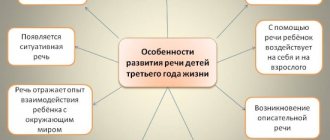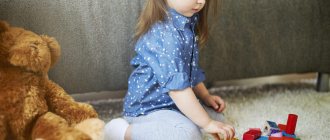Timely development of speech is an important part of the development of the personality as a whole.
It is by communicating with others that the child develops intellectually and mentally. Lagging behind peers can lead to not the best results. Cute babbling and mangling of words at a year and a half turns into a big problem at an older age. By the age of 4-5, a child should be able to speak his native language correctly - When should a child start speaking? Norms in speech development. Uninformed parents may rely on the widespread belief that before the age of 5 it is too early to contact a speech pathologist. Like, each child develops individually, and yours is about to speak in detailed sentences.
When to see a doctor
By the age of 4, children know up to 2000 words, speak clearly, pronouncing words clearly. In speech they use extended phrases of several words. They know how to inflect words and use them correctly in a sentence. They show interest in new words and understand the plot of a fairy tale or short story. Difficulties can be caused by complex words, hissing and sonorant sounds. But these are physiological norms that do not require specialist intervention.
Delayed speech development in children 4 years old can be suspected when they have deviations: in the rate of speech, pronunciation of sounds. Because of problems, the baby prefers to remain silent or speaks fragmentarily.
IRR at 4 years of age increases the likelihood of neurological and even mental abnormalities. An inferiority complex gradually develops, the baby is embarrassed or afraid to communicate with peers, and behaves separately. In the future, this will affect the learning process, academic performance and mastery of the school curriculum. Children whose parents ignore the child’s problem and do not engage in his development are especially in a difficult situation.
Therefore, at the first signs of a speech disorder, you should consult a doctor and begin treatment.
Advice from Dr. Komarovsky
Pediatrician Komarovsky notes that mothers should worry if the child does not speak at three years of age. According to the doctor, RDD most often occurs due to the fact that parents have little communication with the child and do not conduct training sessions. Komarovsky recommends sending children to kindergarten. In a group, girls and boys learn to speak faster than at home in the company of adults.
A well-known pediatrician also gives the following advice:
- examine the baby to find out the reason for his silence;
- perceive the child as a separate, significant person. It is necessary to discuss everyday issues with him (where to go for a walk, what to cook for lunch). Even if the baby does not answer anything, he will begin to form the habit of communicating and his passive vocabulary will be replenished;
- encourage the child’s attempts to pronounce new words, sounds, and imitate adults;
- visit playgrounds more often, invite peers to visit;
- protect your baby from stress.
Peculiarities of manifestation of delayed speech development in children 4 years old
Features of delayed speech development in children 4 years old are slow or fast speech, blurred sounds, omissions of letters or syllables. Some children do not pronounce words at all or abbreviate them, replacing words with syllables, gestures, and facial expressions.
Characteristic symptoms:
- difficulties in formulating the question and in answering the question addressed to him; the answers are usually monosyllabic (“yes”, “no”, “there”, “here”);
- poor vocabulary - usually uses only those words that are used in everyday life;
- incorrect pronunciation of complex words;
- skipping syllables and sounds;
- lack of skills in composing a simple story or sentence based on a picture;
- replacing words that sound similar;
- There are no hissing or whistling sounds in the articulation, or the patient pronounces them incorrectly;
- replacing sounds with easier ones to pronounce;
- lack of criticism of speech errors in oneself and other people.
Mechanical dyslalia
Mechanical or organic dyslalia is caused by structural features of the speech apparatus, such as:
- shortened frenulum of the tongue;
- thick and large tongue;
- small and narrow tongue;
- high narrow (Gothic) or, on the contrary, too low palate;
- malocclusion, in which the sound formation of individual phonemes becomes difficult or, in some cases, even impossible;
- an upper or lower jaw that is too forward, a gap between the teeth or between the jaws;
- sometimes the inability to pronounce sounds is also influenced by the weakness of the air stream necessary for the formation of sounds that are especially difficult for children - r and l.
Most often, with mechanical dyslalia, the speech therapist recommends that the bite be corrected by an orthodontist, if possible. This is best done at the age of 5-6 years, when the joints are most flexible.
Causes of delayed speech development in children 4 years old
Various reasons lead to 4-year-old developmental disorder. Some of them affect the fetus in the womb, some - during childbirth and after birth.
Antenatal reasons:
- complications of pregnancy, threat of miscarriage, toxicosis, gestosis;
- illnesses of the expectant mother - exacerbation of chronic diseases, infectious and inflammatory, injuries, intoxication, bad habits;
- conditions that led to fetal hypoxia - placental pathology (anomalies, abruption), umbilical cord entanglement.
During childbirth:
- premature birth;
- rapid labor;
- injuries during childbirth;
- inadequate management of labor, use of obstetric forceps.
After childbirth, delayed speech development in children 4 years of age can result from:
- injuries, especially traumatic brain injuries, are dangerous for speech development;
- diseases - neurological, for example, cerebral palsy, encephalopathy;
- unfavorable family situation - conflicts, parents do not care for the child;
- the opposite situation is overprotection, excessive pressure and demanding parents;
- excessive stress - physical (sports), mental (overload with activities).
Predisposing factors are a hereditary predisposition to RRD at 4 years of age. These may be genetic disorders, congenital abnormalities of the nervous system,
When silence is not golden
Problems with sound pronunciation, clarity and coherence of speech directly affect such mental processes as memory, thinking, attention, etc. This means that prolonged non-speaking leads to deeper disorders. At 4-5 years old, a non-speaking child is diagnosed with OSD - general underdevelopment of speech against the background of normal intelligence and hearing. OHP can be of 4 levels, but any of them is a reason for correction. Considering the age of the children, by this time the gap from their peers is already quite significant, so you will have to study a lot and persistently.
Methods of treating RDD at 4 years of age
Correction of delayed speech development in children 4 years old takes place with the participation of a speech therapist, neurologist, psychologist, and ENT doctor. First, a diagnosis is carried out, during which specialists identify the cause of the defect, find out the features of the course of the antenatal, intranatal (childbirth period) and postpartum period. They study the outpatient card, previous diseases, the nature of physical and neuropsychic development up to one year and at an older age.
This is followed by the stage of hardware examination methods to clarify the diagnosis and exclude organic pathology of the ear, brain, and articulation organs. Electroencephalography, X-ray, MRI or CT scan of the brain, and audiometry are performed. After an accurate diagnosis has been made, treatment for mental retardation begins at 4 years of age: it should be comprehensive, using various methods.
Held:
- Drug treatment - nootropics, sedatives, vitamins, as well as herbal medicines;
- Speech therapy correction - speech therapy massage of the tongue, lips, facial muscles, articulation gymnastics, breathing exercises;
- Physiotherapeutic procedures, including magnetic therapy, acupuncture;
- General massage;
- Physiotherapy.
All treatment procedures are prescribed by a specialist. He knows the characteristics of your child’s 4-year-old RRD, the cause, and based on this he selects an individual treatment regimen. It is unacceptable to independently prescribe a drug, even if it is herbal, to change the dose of a medicine prescribed by a doctor or to cancel it.
An important component of successful treatment is eliminating the cause of the defect. Conflicts, quarrels, mental and physical stress should be avoided.
With the timely start of the correctional program, the absence of severe neurological and mental pathology, and the active participation of the child and parents in the treatment process, the prognosis is favorable. Children's pathological pronunciation of sounds disappears, they begin to speak correctly, clearly and expressively. They ask and answer questions competently. The vocabulary is gradually expanding.
A 4-year-old child diagnosed with RRD is being registered at a dispensary. Specialists monitor him and monitor his further development of speech skills. This is necessary to prevent relapse of the disease. If this happens, it is important to start therapy on time.
Reviews and comments
You can share your successes in this difficult but very enjoyable task below.
We also recommend that you familiarize yourself with the lessons on rhetoric on our website and the article “Tongue twisters for the development of speech and diction.”
We also recommend reading:
- Storytelling
- Piaget's theory of cognitive development
- Positive therapy for children
- How to stop a child from being capricious: 14 effective tips
- Getting ready for the new school year
- How to motivate a child to read?
- Formation of self-awareness
- Development of communication skills in children
- How to teach a child to read: rules, tips and tricks
- Socialization of personality: briefly about the main thing
- Exercises for memory development in preschoolers
Key words:1Children
The role of parents in the treatment of mental retardation at 4 years of age
Eliminating speech development delays in 4-year-old children is a matter for specialists with the appropriate education and skills. But parents also play a big role. First of all, the situation in the family has an impact on the child’s condition, including the development of speech. Conflicts and quarrels, even if the baby is not involved in them, affect the child’s psyche. This is fraught with a slowdown in the pace of development.
In addition, in some families no one takes care of the children. They are left to their own devices. If there are prerequisites, for example, close relatives have a speech pathology, then we can talk about a hereditary factor. Such a child will have speech delays.
The next point is the presence of a person with incorrect speech in your environment. The baby will imitate him and speak incorrectly. Experts recommend protecting your child as much as possible from people with pathological speech. That is why parents should always speak correctly, pronouncing all sounds clearly and slowly. You cannot lisp the baby or distort words - this rule must be followed by all family members.
Overprotection also contributes to delayed speech development in children 4 years old. Don't demand anything supernatural from your child. Each person develops at his own pace. By overloading your son or daughter with activities, without leaving a minute of free time, you only make things worse: this is constant stress for children. This can cause other defects to appear: stuttering, enuresis, sleep disturbances.
What to do if a child does not understand speech?
At the “BEFORE” correction stage of the tertiary cortex (that is, with auditory speech agnosia), Tomatis is ideal for helping. This can be seen both in practice (the understanding of speech in children who did not even respond to their name is amazingly improved) and in the study of evoked potentials. Of course, auditory stimulation must be combined with speech therapy sessions, but even without them there is always a huge leap in speech perception.
And at the level of the tertiary cortex (when auditory speech gnosis is well formed), the help of a speech therapist is necessary for the development of language, the acquisition of polysemy of words, and the elimination of agrammatisms. And classes need to be taken regularly and for a long time.
By the way, the understanding of speech deficits that is closer to me is not discrete (there is speech, there is no speech, hence the term “alalia”, that is, absence of speech), but a continuous one, because even after the start of speech, the child continues to master the language system (that’s why I really like the term “dysphasia development").
Neuropsychologist Alexandrova O.A.
Child doesn't speak? Doesn't understand speech? Sign up for a consultation by phone or fill out the form on the website.
Correction of speech regression
If the baby has stopped babbling or speaking, then you need to immediately figure out the cause of the illness. First of all, you should visit an appropriate specialist. If the baby suddenly stops talking due to stress, then an examination by a psychologist will be required. If there are no apparent reasons, you should visit a neurologist. A child who has stopped speaking due to aphasia first needs treatment for the underlying disease.
The child may be prescribed:
- medications;
- surgery;
- mechanotherapy and physiotherapy;
- speech therapy massage and exercise therapy.
For children who do not speak, speech therapy sessions are also prescribed. Teachers help the child restore speech. Writing and reading skills are developed (if necessary). If the child has stopped speaking, then correctional classes with a neuropsychologist and/or speech therapist should begin as early as possible. This can be done at the NEAPL Center for Speech Therapy and Psychology. Experienced specialists will identify the cause of speech regression and, if necessary, refer you to specialized doctors or select an effective corrective program.
At the doctor
The first specialist you should contact in case of any suspicion, doubt, or question regarding the development of your child’s hearing is a regular otolaryngologist in your local clinic. He will conduct an initial examination and simple tests. If truly serious conditions are identified, he will definitely refer you to an audiologist. The latter has a whole “battery” of tests in its arsenal, including:
- tympanometry;
- special methods of pediatric audiometry;
- registration of otoacoustic emissions;
- audiogram, etc.
Of course, the older the child, the easier it is to agree with him so that he does not spin around, struggle, or scream during the diagnosis. Some children behave well with the participation of a teacher of the deaf, who helps conduct examinations in a playful way.
It has been noticed that children are afraid of one doctor, but they flock to another as if they were their own. A kind specialist who knows how and loves to work with children can always be found in the clinic of the MasterSlukh network.
For newborns and infants, perhaps the only objective method is used - KSVP. Read more about it and about registering for this examination here.









